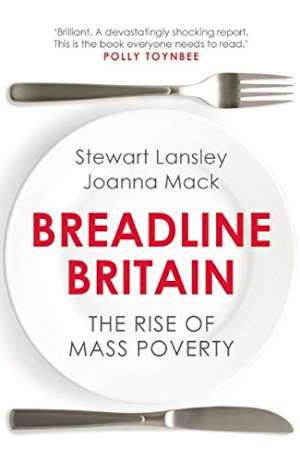24 June 2015
Breadline Britain. The rise of mass poverty
Stewart Lansley and Joanna Mack
2015, Oneworld, 258 pages, £9.99
ISBN 9781780745442
Reviewer: Rosemary Connell

This book is very well written and researched and is based on a series of carefully designed surveys.
Since the late 1970’s Britain has become richer, but poverty rates have not gone down. How should poverty be measured? In relative or absolute terms? In 2010 it was statutorily recognised that poverty should be measured relative to median income leading to much debate much of which is clearly described by the authors. The surveys of 1983, 1990, 1999, and 2012 showing attitudes to necessities for adults reveal that the public believe that minimum living standards should reflect contemporary, not past, lifestyles.
The Breadline Britain approach says that a person is only deprived when they want but cannot afford a necessity. The proportion of households that cannot afford minimum housing and heating standards has risen between 1999 and 2012. Food poverty and the use of food banks have risen. In areas where poorer people spend a greater proportion of their income, food, fuel and rents, prices have increased faster than inflation.
Forty per cent of those defined by the surveys as being in poverty are in full time employment, whereas only 9% of retired are classified as poor. Job insecurity and zero hours contracts have increased. The UK and USA head the league tables of the proportion of people in low paid work (25% and 20% in 2010). Middle income jobs have been squeezed with the rise of automation while the proportion of very high paid and very low paid people have both increased. Squeezing middle income earners, often the creators of growth may well be counterproductive.
The failure of housing policy has been a driver of the rise in poverty, propelling increasing dependency on the under regulated private housing market. The waiting list for social housing reached 1.8 million in 2012. The right to buy has led to a significant transfer of house ownership to the private rented sector rather than private ownership. Because of higher rents the housing benefit bill has risen sharply.
The authors believe that large corporate cash surpluses have led to low pay and job insecurity as in UK and USA and that these surpluses are often used for financial restructuring rather than much needed investment. Mergers and acquisitions can create large companies with monopoly power, which are then able to pressurise suppliers to slash their costs. It is also argued that the number of privatisations has led to higher rises in especially utility bills than there would have been without privatisation. It is claimed too that the media have increased their anti benefit claimant coverage and in some instances the government are blaming the poor for their poverty.
Inequality and lack of opportunity especially for the young are fundamental problems for Britain. To tackle poverty inequality and deprivation a wholly different raft of political choices are extensively discussed, including a progressive tax system. Interesting thoughts on the momentum for change are described.
This book should be widely read and discussed especially by politicians and the media. It provides a panorama of food for thought on important issue of the day.
